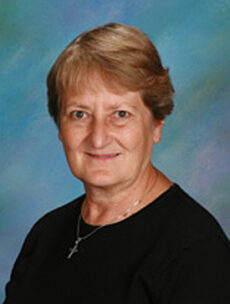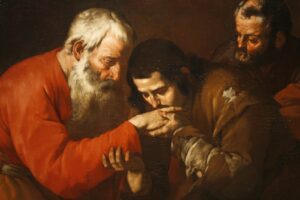Jesus rejoices in finding the lost – do we?

Sister Rachel Bergschneider, OSB
Living the Word / Sister Rachel Bergschneider, OSB
Twenty-Fourth Sunday in Ordinary Time / Sept. 11
Exodus 32:7-11,13-14; Psalm 51:3-4,12-13,17,19; 1 Timothy 1:12-17; Luke 15:1-32
Not unlike other passages in Luke’s Gospel, today’s Gospel begins with a short discussion between the Pharisees/scribes and Jesus. The Pharisees are a bit disturbed that Jesus would eat with them, then lower Himself to eat with sinners. What kind of a God figure would display such poor judgment!
This is precisely the point Jesus wants to make here. He makes His point at length by telling three incredible, almost fanciful stories. It is easy to dismiss the impact of the stories because they seem so unreal . . . leaving 90 sheep to find one sheep, sweeping the floor for hours to find one coin and then having a party to celebrate it, and a father caught between his two sons and willing to forgive the younger son for his irresponsibility by throwing a party for him. The lesson for the Pharisees and scribes is perhaps lost. For us, the point to these stories is almost more than we can take in.

A painting titled “The Return of the Prodigal Son,” by an unknown artist, is pictured at the Museum of Biblical Art in New York. (CNS/Bob Roller)
In these stories Jesus wants us to know who God is. He wants us to believe in a God who is boundless in generosity, gracious and compassionate in loving, and totally selfless. But, somehow, we halt a bit. We go back to joining in with the Pharisees and scribes who don’t really believe that God can be so “crazy” for people and creation.
We who are followers of this God know the cost it is to us. We profess to go out of ourselves, to be like God, to attend to the lost, to search for the small ones who are hidden in the cracks, and, to unconditionally forgive. But it is so difficult to empty ourselves for others like our God does, to be totally selfless.
LOSS IS NOT THE END
The Scriptures today also talk about losing, finding, and rejoicing. Loss is integral in each of these stories — the lost sheep, the lost coin, the lost son. Even the Pharisees and scribes experience the loss of status when Jesus does not discriminate with whom He dines.
We all have losses. Loss can do many things to us. When we lose something, we immediately want to find it. When the loss is a person, we realize the permanence of the feeling of separation. The feeling of loss is a destabilizing sense. Loss throws us off balance. It is difficult to know where to focus. What we hold so dear is no longer with us.
For Jesus, loss is not the end of the story. We search for what is lost. We do so because we hope to find it. We are all lost in some parts of ourselves. Who has not squandered rich possibilities? Who does not possess within oneself, yet lost to sight, the potential for goodness, helpfulness and joy? Each of us, somewhere in ourselves, is lost for any number of reasons.
But joy comes with finding what we have lost. Jesus welcomes not only the lost sheep, the son who was lost, but each of us who finds what we have lost within ourselves.
Perhaps the older son in the story of the Prodigal is the saddest of all. He is not able to rejoice and join the party. He has missed who his father really is. He has focused on himself and what he deserves rather than rejoicing in the possibilities of new life in his brother.
Today we hear, “I tell you, there will be more joy in heaven over one sinner who repents than over 99 righteous persons who need no repentance.” (Luke 15: 7)
Let us not find ourselves with the older son or the Pharisees!
—
SISTER RACHEL BERGSCHNEIDER, OSB, is a member of the Sisters of St. Benedict of St. Mary Monastery, Rock Island. She ministers at the Peoria County Jail, serving as a facilitator in the Jobs Partnership program.





